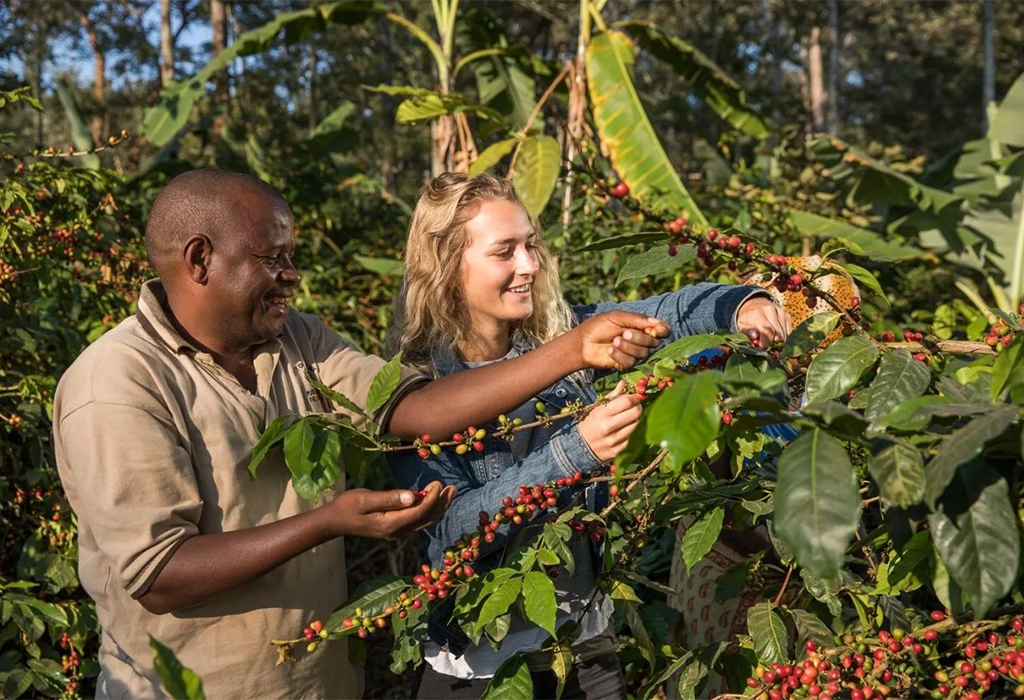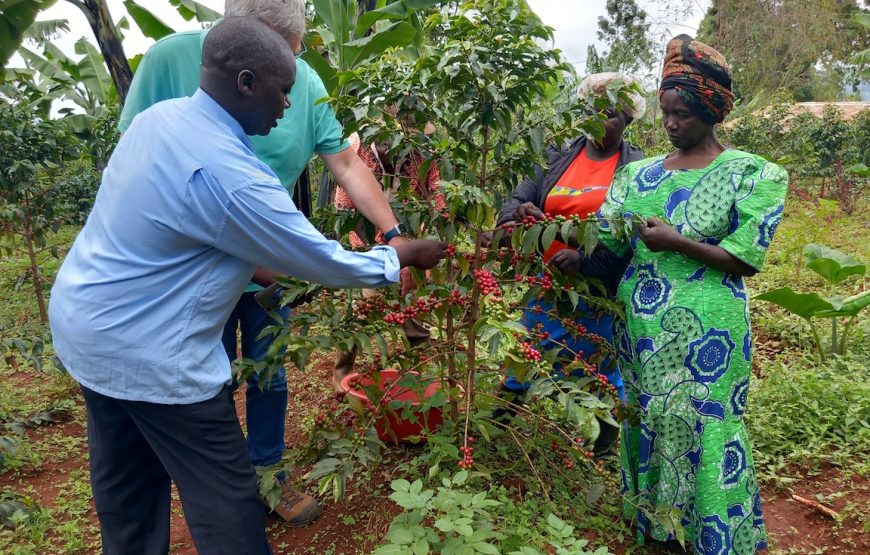Coffee Tours near Mount Elgon: A Cultural Experience
Where Mountains Meet Coffee
On the fertile slopes of Mount Elgon, Uganda’s majestic extinct volcano that rises gracefully on the border with Kenya, there lies a story that is as much about people as it is about the land. This is the story of coffee, a crop that has shaped lives, defined cultural identities, and carried the flavor of this mountain to distant corners of the world. For generations, the communities living around Mount Elgon have cultivated Arabica coffee, tending it with methods passed down through centuries. To walk through these plantations, to pick the ripe cherries alongside local farmers, and to sip a freshly brewed cup while overlooking cascading valleys is to immerse oneself in an experience that blends culture, agriculture, and hospitality into one.
Coffee tours near Mount Elgon are more than agricultural visits; they are cultural journeys. They connect visitors to the rhythms of rural life, reveal the processes behind one of the world’s most cherished beverages, and celebrate the traditions of the Bagisu and Sabiny communities who call the mountain home. With its unique volcanic soils, cool altitudes, and rich rainfall, Mount Elgon offers some of the finest Arabica coffee in the world, and the tours open a window into how geography and culture together create this treasure.
The Roots of Coffee on Mount Elgon
Coffee has long been intertwined with the history of Uganda, and Mount Elgon in particular has emerged as one of the most important centers of Arabica production. The story begins with the arrival of Arabica plants in East Africa during the late 19th century. Farmers on the fertile slopes of Mount Elgon quickly discovered that the combination of high altitude, well-drained volcanic soils, and reliable rainfall created the perfect environment for coffee cultivation.
Over time, coffee became not just a crop but a cultural cornerstone. For the Bagisu, who inhabit much of the mountain’s Ugandan side, coffee became integrated into social practices, rituals, and economic systems. Families cultivated coffee on smallholder plots, and the cherries harvested were both a source of income and a foundation for community exchange.
Today, Mount Elgon’s coffee is globally recognized for its rich aroma, bright acidity, and complex flavor profiles. International markets prize it, and specialty coffee buyers seek beans from the region. Yet what makes coffee from Mount Elgon truly unique is not only its taste but the cultural story that infuses every bean.
Coffee Cultivation: From Seed to Cherry
Visitors embarking on coffee tours near Mount Elgon are often struck by the careful attention given to each stage of the cultivation process. Unlike large commercial plantations, coffee in this region is primarily grown on smallholder farms, often less than two acres in size. This small-scale approach allows for meticulous care and community involvement.
The journey begins with the planting of coffee seeds in nurseries. Farmers nurture seedlings for months, ensuring they are strong enough to withstand the mountain’s diverse weather conditions. Once transplanted into the fields, the young coffee plants grow under the shade of bananas and indigenous trees, which not only protect them from direct sunlight but also enrich the soil.
As the plants mature, they produce blossoms that transform into clusters of green cherries. Over several months, these cherries ripen slowly, turning from green to a deep red. The slower maturation process at higher altitudes enhances the bean’s density and flavor complexity. Harvesting is done by hand, with great care taken to pick only the ripest cherries. This labor-intensive practice reflects the pride farmers take in maintaining quality.
To walk among these farms, to feel the volcanic soil beneath one’s feet, and to see the dedication etched into every row of plants is to understand that coffee here is grown not just as a commodity but as a heritage.
Processing Coffee: From Cherry to Bean
Coffee tours reveal that cultivation is only the first part of the journey. Once harvested, the cherries undergo careful processing, a stage that profoundly influences the flavor of the final cup.
Two main methods are practiced in Mount Elgon: washed processing and natural processing. In washed processing, cherries are pulped to remove the outer skin, and the beans are fermented in water tanks to break down the mucilage. After washing, the beans are dried in the sun, spread out on raised platforms, and regularly turned to ensure even drying.
In natural processing, the cherries are dried whole, with the fruit intact. This method requires careful attention, as the fruit must be turned to prevent spoilage. The resulting coffee often carries a fruitier profile, with hints of berries and wine-like notes.
Both methods highlight the patience and skill of the farmers, who balance traditional knowledge with modern practices. Visitors can participate in these stages, helping to wash, sort, or dry the beans, gaining firsthand insight into the labor behind each cup. The aroma that emerges from drying coffee, a blend of earthiness and sweetness, lingers in memory long after the tour ends.
Roasting and Brewing: The Final Transformation
The final transformation from raw bean to aromatic drink occurs in the roasting and brewing stages, often demonstrated at the end of a coffee tour. In villages around Mount Elgon, roasting is both a practical and social event. Beans are placed on iron pans over open flames, with the crackling sound and rising aroma filling the air.
The freshly roasted beans are ground and brewed using traditional methods, producing a rich, aromatic cup. Guests are invited to share in this experience, not only tasting the coffee but participating in its preparation. To sip coffee while overlooking the lush valleys of Mount Elgon is to savor the journey of the bean from soil to cup, enriched by the cultural warmth of the people who cultivate it.
Coffee and Culture: The Bagisu and Sabiny Traditions
What distinguishes coffee tours near Mount Elgon is not only the agricultural process but the cultural traditions that surround it. The Bagisu people, for example, hold coffee in high regard, integrating it into rituals and ceremonies. Coffee is often shared as a symbol of friendship and hospitality, served to visitors as a gesture of welcome.
During imbalu, the Bagisu initiation ceremony, coffee plays a role in community gatherings, reflecting its deep-rooted place in social life. For the Sabiny, who inhabit the eastern slopes of Mount Elgon, coffee cultivation similarly blends with daily practices and traditions. These communities view coffee not only as an economic lifeline but also as a reflection of identity and continuity.
Tour participants often find that the cultural stories shared during these visits are as enriching as the coffee itself. Elders recount how coffee sustained their families during difficult times, while younger generations speak of new opportunities through specialty markets and tourism. In these narratives, coffee emerges as a thread that weaves together past, present, and future.
Coffee and the Land: The Environmental Connection
Mount Elgon’s unique environment is inseparable from the coffee grown on its slopes. The mountain’s soils, enriched by ancient volcanic eruptions, provide nutrients essential for healthy coffee plants. The altitude, ranging from 1,500 to 2,300 meters, slows the maturation of cherries, enhancing their complexity. The abundant rainfall ensures steady growth, while cooler temperatures create ideal conditions for Arabica varieties.
Sustainable practices are also deeply embedded in the region’s coffee culture. Farmers interplant coffee with bananas, beans, and shade trees, creating agroforestry systems that preserve soil fertility, reduce erosion, and support biodiversity. Visitors on coffee tours witness these environmentally conscious methods firsthand, understanding how ecological balance is preserved while livelihoods are sustained.
In recent years, organic certification and fair-trade practices have gained momentum in Mount Elgon. These initiatives not only ensure environmental responsibility but also enhance the livelihoods of farmers by connecting them to premium markets. The result is coffee that carries not only exceptional taste but also the assurance of sustainability.
The Global Journey of Mount Elgon Coffee
While much of the coffee cultivated near Mount Elgon is consumed locally, a significant portion finds its way to international markets. Specialty roasters across Europe, North America, and Asia prize beans from the region, often highlighting their unique profiles in global competitions.
To taste Mount Elgon coffee abroad is to connect with the landscapes and communities that nurtured it. Yet the experience of drinking it at the source, within sight of the mountain itself, offers an authenticity unmatched elsewhere. Coffee tours make this connection tangible, bridging global appreciation with local heritage.
The Experience of a Coffee Tour
For travelers, a coffee tour near Mount Elgon is not a hurried excursion but a journey into culture and landscape. It begins with a walk through terraced farms, where guides explain the cultivation process and introduce the farmers who tend each plot. The tour progresses through harvesting, processing, and roasting, often allowing guests to try their hand at each stage.
Along the way, the beauty of Mount Elgon’s scenery enhances the experience. Rolling hills stretch into valleys, rivers cut through fertile landscapes, and the distant peaks of the mountain rise above clouds. Villages welcome visitors with warmth, offering traditional meals alongside steaming cups of coffee.
The experience is immersive, engaging all the senses. The touch of cherries freshly plucked, the aroma of roasting beans, the taste of freshly brewed coffee, the sound of songs sung during communal work, and the sight of lush plantations together form a memory that lingers long after departure.
Best Time for Coffee Tours near Mount Elgon
The timing of a coffee tour significantly influences the experience. The harvesting season, which typically occurs from October to February, offers the most interactive opportunities. During these months, visitors can participate in picking cherries, observing processing firsthand, and tasting freshly harvested beans.
The rainy season, from March to May, transforms the landscape into a lush, green paradise, enhancing the scenic beauty of the farms, though some activities may be limited by weather conditions. The drier months, particularly June to September, are excellent for exploring farms, engaging with communities, and combining coffee tours with treks into Mount Elgon National Park.
Each season carries its charm, but for those wishing to experience the full journey of coffee from cherry to cup, the harvesting months are most rewarding.
Beyond Coffee: A Gateway to Mount Elgon’s Wonders
While coffee is the centerpiece of these tours, it often serves as a gateway to the wider attractions of Mount Elgon. Many visitors combine coffee tours with treks to Sipi Falls, explorations of the national park, or cultural interactions in nearby villages. The proximity of farms to these attractions allows for a holistic experience of nature, culture, and agriculture.
Thus, coffee tours become not only cultural encounters but also integral parts of a broader exploration of Uganda’s eastern highlands.
A Cup That Holds a Story
To take part in a coffee tour near Mount Elgon is to discover that coffee is not simply a beverage but a story of land, people, and tradition. From the volcanic soils that nurture the plants to the hands that harvest the cherries, from the rituals of the Bagisu to the innovations of modern farmers, every bean carries a heritage that is both deeply local and globally celebrated.
The experience immerses visitors in a cultural exchange, allowing them to witness and participate in the making of a product that connects Uganda to the world. It is an invitation to walk the fields, share the stories, and sip the flavors that define a region.
For those seeking to transform their travels into meaningful cultural encounters, arranging coffee tours and other authentic adventures through WildHorn Africa ensures a journey that is both enriching and seamlessly guided. With expertise in showcasing the best of Uganda’s heritage and wilderness, WildHorn Africa offers travelers the chance to experience Mount Elgon not just as a mountain but as a living cultural landscape.






